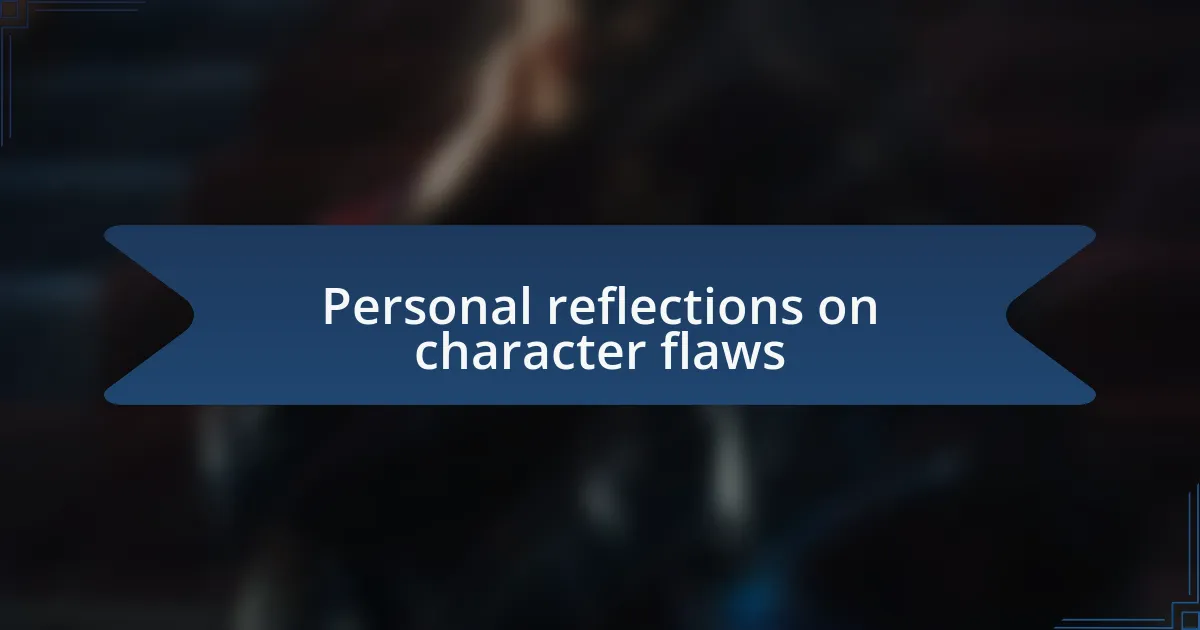Key takeaways:
- Understanding character flaws enhances our connection to stories, reflecting our own struggles and vulnerabilities.
- Agatha Christie’s characters, like Hercule Poirot and Miss Marple, exemplify relatable imperfections, promoting self-reflection and deeper engagement.
- Character flaws serve as catalysts for growth and development in narratives, illustrating the balance between strength and imperfection.
- Flaws highlight the humanity in storytelling, allowing readers to draw inspiration from characters overcoming their challenges.

Understanding relatable character flaws
Understanding relatable character flaws can deepen our connection to stories. Have you ever found yourself falling for a character’s quirks, like their stubbornness or tendency to overthink things? I recall reading about a detective with a knack for both brilliance and blunders, making me reflect on my own imperfections and how they shape my experiences.
These flaws make characters more authentic and mirror our own struggles. I remember wrestling with my own need for control, much like a character who meticulously organizes their environment while chaos swirls around them. It’s a compelling reminder that imperfection can coexist with intelligence and strength, resonating with anyone who has faced similar challenges.
When we embrace flaws, we pave the way for growth and transformation within narratives. Readers often wonder if these traits hold characters back or propel them forward—what do you think? This tension between their flaws and their journey invites us to reflect on our paths, revealing that vulnerability can be a source of strength in our own lives.
Agatha Christie’s unique character portrayals
Agatha Christie has a remarkable talent for bringing characters to life through their distinct and relatable flaws. Take Hercule Poirot, for instance; his obsessive attention to detail often leads to both comedic and poignant moments. I remember laughing at his idiosyncratic behavior while appreciating how it reflects my own desire for precision in my work. Isn’t it intriguing how these quirks draw us closer to their humanity?
Then there’s Miss Marple, whose apparent simplicity belies a sharp wit and a keen understanding of human nature. Her ability to see through people, despite her unassuming demeanor, reminded me of those times when I underestimated someone’s insights based on their outward appearance. Have you ever found that the quiet observers often know more than they let on? This depth in Christie’s characters instills a sense of relatability, prompting us to reconsider our judgments.
Moreover, characters like Colonel Race and some of Christie’s lesser-known figures exemplify vulnerability alongside their strengths. I often find myself reflecting on how their flaws serve not only as obstacles but also as catalysts for their development. Isn’t it a beautiful paradox that what makes them imperfect also makes their triumphs all the more remarkable? Through these portrayals, Christie invites us to explore the delicate balance between strength and flaw, making her characters unforgettable.

Personal reflections on character flaws
Exploring character flaws in Agatha Christie’s work reminds me of my own imperfections. For instance, take the extreme vanity of some characters. I can relate to that sense of pride because there have been moments when I’ve let my ego cloud my judgment in a professional setting. Have you ever felt that your self-perception might be a flaw in disguise? It’s those moments that connect us to the characters, showcasing how their failings can sometimes mirror our own.
In my experience, the fear of inadequacy that some characters exhibit resonates deeply. I think of characters who constantly second-guess their abilities, a trait I’ve battled in my own life, especially when faced with challenging situations. Viewing their journeys as they confront these fears can be both a source of comfort and insight. Isn’t it fascinating how vulnerability, often seen as a weakness, can actually be a powerful driving force in character development?
Then there’s the trait of stubbornness that Christie’s characters often embody. I recall a time when I stubbornly clung to an opinion in a debate, only to realize later that my rigidity had hindered a productive discussion. This is where I find resonance with characters who struggle against their own inflexibility. Can you remember a time when your unwillingness to change your stance presented an obstacle? Christie’s portrayal of these flaws not only sharpens their narratives but also invites us to reflect on our own traits, encouraging growth and understanding.

How character flaws enhance storytelling
Character flaws are more than just imperfections; they serve as crucial catalysts that propel the narrative forward. I often find that when a character grapples with a major flaw—like jealousy or addiction—it can create an intense emotional rollercoaster for the reader. For example, I remember reading a book where the protagonist’s obsessive nature led to their downfall, making me reflect on how my own fixation on minor details sometimes affects my relationships. How often do we overlook the bigger picture because we’re so hung up on what we think is important?
Christie’s characters frequently showcase traits like arrogance, which, while off-putting, add depth to their stories. I once encountered a colleague who embodied this arrogance, believing they were always right. Watching that person struggle with teamwork illuminated for me how such flaws can create both conflict and transformation in a narrative. It begs the question: can we ever truly relate to someone who seems infallible? In contrast, seeing characters navigate their flawed paths often feels much more relatable and inspiring.
We see that these personality shortcomings don’t just create tension; they highlight the humanity in storytelling. When I think about moments in my life where I’ve made poor choices driven by my flaws, I realize they have shaped who I am today. Isn’t it interesting how characters who face significant challenges due to their flaws can inspire us in our own journeys? This connection highlights the beauty in storytelling: it’s through embracing these imperfections that we come to appreciate character growth and resilience.